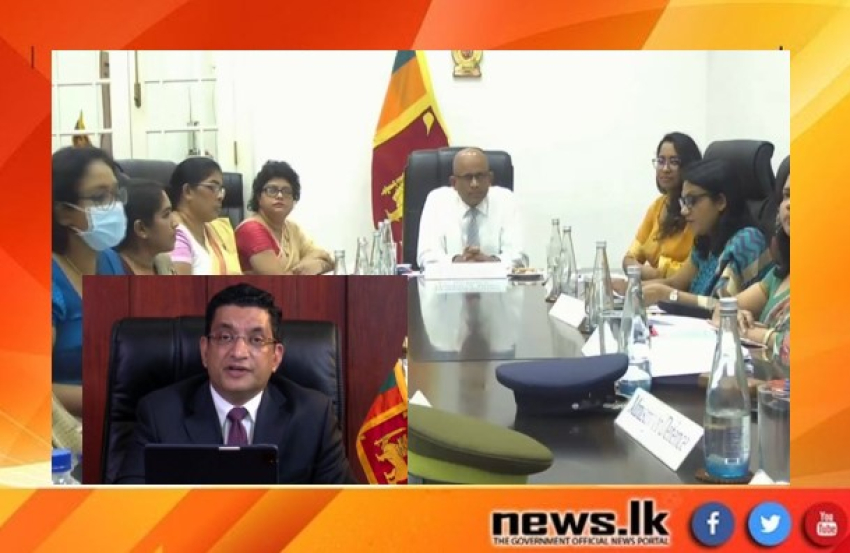Report was prepared by the Ministry of Foreign Affairs with input from government ministries and agencies through an inclusive and broad-based process where civil society organizations and the National Human Rights Commission of Sri Lanka were also consulted.
The UPR is conducted as a review mechanism by the UPR Working Group of the UN Human Rights Council in four year cycles. Sri Lanka's last UPR review was in 2017.
Delivering the opening statement via a pre-recorded statement, the Head of Delegation, Foreign Minister Ali Sabry highlighted the progress and achievements made by Sri Lanka since its last review including the implementation of the recommendations accepted. Sri Lanka envisages 2023, the 75th anniversary of independence, to be a year of socio-economic stabilization, reconciliation, and recovery. The Minister also said that "it is important to learn from the past, and it is equally important to move on, to build better and stronger."
The Permanent Representative to the UN in Geneva Ambassador Himalee Arunatilaka highlighted legislative and policy measures implemented by Sri Lanka during the reporting period including the 21st Amendment to the Constitution, strengthening efforts on the reconciliation processes and the national independent institutions.
The Sri Lanka delegation responded to the queries and comments from the floor ranging from issues relating to inter alia freedom of expression and assembly, the Prevention of Terrorism Act (PTA), migrant workers, rights of minorities, combating corruption, social protection, rights of women, persons with disabilities, children, food security and progress achieved on SDGs.
The Review was conducted in a constructive atmosphere with the participation of delegates from 106 countries providing their appreciation, comments and recommendations covering a broad range of issues on the floor. Appreciation was expressed for the implementation of recommendations accepted by Sri Lanka in the 3rd Cycle, despite the socio economic challenges posed by the COVID pandemic and global crises.
Serbia, Zambia and Cuba welcomed the implementation of recommendations accepted in the last Cycle.
Bangladesh welcomed efforts "to establish gender equality, and curb gender based violence". Bhutan commended Sri Lanka for its "concerted efforts and progress in implementing its human rights obligations despite the enormous socio-economic challenges." Nepal welcomed the adoption of the National Nutrition Policy. India "took note of the engagement by the Government of Sri Lanka with members of the international community and other organizations on various aspects of human rights situation and reconciliation issues in Sri Lanka." Maldives congratulated the Government for "introducing a policy for Gender Mainstreaming in all sectoral Ministries that includes the establishment of gender focal points, gender-responsive budgeting and anti-sexual harassment committees." Pakistan appreciated "Sri Lanka's continued cooperation with UN human rights mechanisms" while also welcoming "legislative, administrative measures such as the enactment of the Prevention of Terrorism Act (Amendment) Act No 12 of 2022, 21st Amendment to the Constitution and measures under National Anti-Human Trafficking Task Force".
Thailand commended Sri Lanka for achieving COVID vaccination coverage of its targeted population above WHO targets.
Japan appreciated "the positive steps taken by Sri Lanka since the previous review cycle, including the implementation of Amendments to the Prevention of Terrorism Act". Japan said it "considers it important that the international community support Sri Lanka's own efforts to foster reconciliation in the country".
Chile, Egypt and Ireland also noted with appreciation the recent amendments to the PTA.
The UK welcomed "Sri Lanka's commitments on respect for the rights of those from all religious and ethnic groups" and further said Sri Lanka's "recent efforts to foster political inclusion and constitutional reform are particularly welcome."
Qatar, noted with appreciation the adoption of the National Action Plan on Women, Peace and Security". This was also welcomed by Spain. Algeria, welcomed the "constitutional amendment of 2022".
Türkiye was "pleased to observe that Sri Lanka amended the Prevention of Terrorism Acts and held an All-Party Conference to revive reconciliation process."
The Philippines welcomed the "recent approval of the establishment of the Office for Overseas Sri Lankans".
Nigeria commended the Government for its "unwavering commitment to its international human rights obligations and continued cooperation with human rights mechanisms."
Saudi Arabia commended Sri Lanka's "tireless work to achieve the goals of sustainable development and combat human trafficking".
Namibia appreciated the "specific legislative, policy and institutional measure adopted by Sri Lanka with the aim of fulfilling its obligations under international human rights law."
Oman appreciated the National Action Plan to combat trafficking of persons.
China, Russia, Cuba, Venezuela and Malaysia made supportive statements on Sri Lanka's efforts.
UAE appreciated "ongoing national reconciliation path in line with local priorities and policies".
Several other countries commended Sri Lanka's continuous efforts to promote human rights of its people, in particular the adoption of the 21st Amendment to the Constitution, work of the independent commissions and domestic reconciliation efforts including the work of the OMP, OR and ONUR. Countries also underlined the importance of the promotion and protection of the rights of children, women, persons with disabilities, older persons and migrants. Many countries appreciated the constructive engagement of Sri Lanka with the UPR process and the efforts taken in preparing the national Report.
Belgium appreciated "efforts by the government to tackle gender-based violence" while noting remaining challenges.
Azerbaijan, Ethiopia, Hungary and Vietnam commended Sri Lanka's progress made on the SDGs. Several countries welcomed Sri Lanka's efforts towards socio-economic stabilization, reconciliation and recovery despite challenges.
While thanking all Government and civil society partners who engaged in the UPR process and the delegations who spoke during the Review, Sri Lanka's Permanent Representative in Geneva said that Sri Lanka will carefully consider the recommendations received.
In closing the Review, the President of the Council and Chair of the Session, PR of the Czech Republic thanked the Sri Lanka delegation for its engagement and readiness to answer all questions and comments, as well as the preparations which he said were done "in an excellent manner."
The delegation of Sri Lanka was led by Foreign Minister Ali Sabry. The delegation in Geneva comprised the Permanent Representative of Sri Lanka to the UN in Geneva, senior officials from the Presidential Secretariat, the Attorney General's Department, Ministry of Foreign Affairs and the Permanent Mission of Sri Lanka to the UN, as well as over 20 line Ministries joining virtually from Colombo.
Permanent Mission of Sri Lanka to the UN
Geneva




















